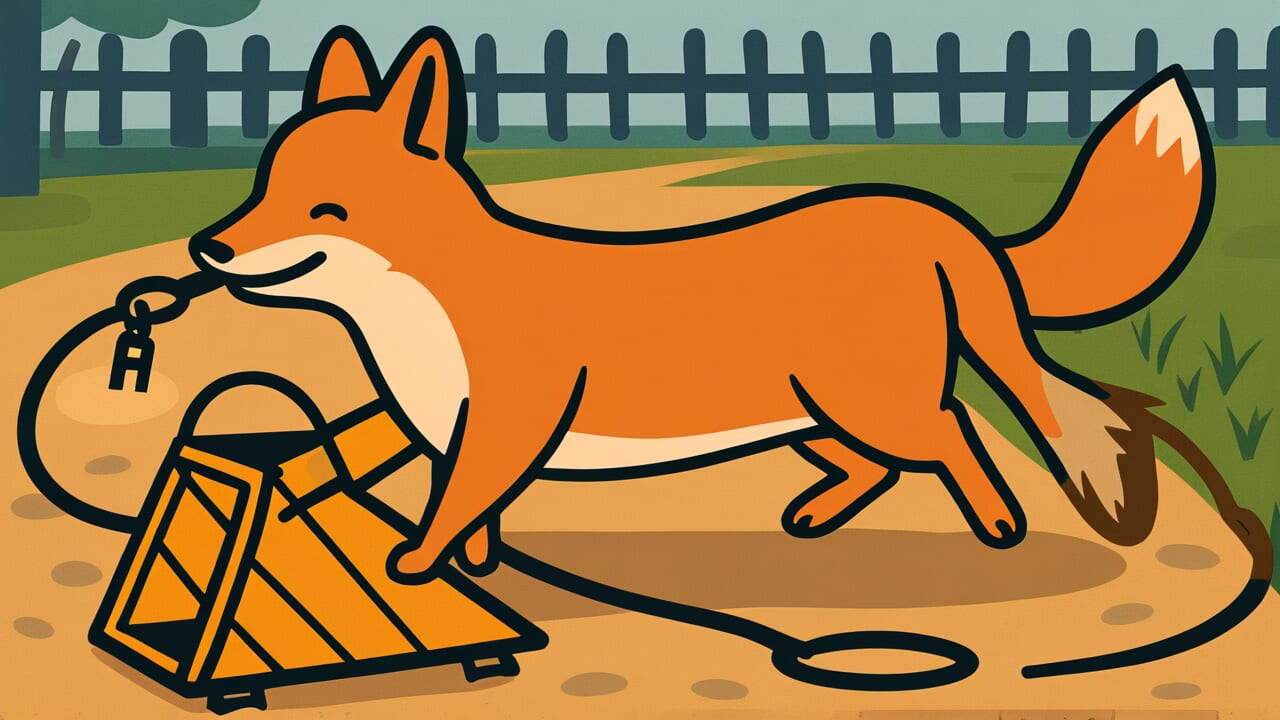How to Read “A fox gets caught in a rabbit’s trap”
Usagi no wana ni kitsune ga kakaru
Meaning of “A fox gets caught in a rabbit’s trap”
“A fox gets caught in a rabbit’s trap” describes a situation where someone who wasn’t the intended target gets caught up in trouble or a scheme.
Just like a trap set for rabbits unexpectedly catches a fox instead, this proverb refers to when plans or strategies affect the wrong person.
This saying is used when plans or schemes take an unexpected turn. The person affected is completely different from the original target.
For example, imagine someone plots to cause trouble for a specific person. But a completely unrelated third party gets caught up in it instead.
The contrast between the rabbit and fox makes this proverb effective. A trap meant for a small rabbit catches a larger, supposedly smarter fox.
This unexpected twist emphasizes how unpredictable situations can be. Even today, this idea applies to many scenarios.
Security measures or regulations sometimes affect people they were never meant to target. The proverb captures this absurdity through simple animal imagery.
It’s a clever way to express how the wrong people sometimes suffer misfortune.
Origin and Etymology
The exact origin of this proverb is unclear. However, the structure of the phrase reveals an interesting background.
Rabbits and foxes have long lived in Japan’s rural mountain areas. They were familiar animals to people in the countryside.
Rabbits were valued as food. Farmers set traps to catch them for their households.
Foxes, on the other hand, were known as larger and smarter animals than rabbits. Traps are usually designed to match the size and habits of the intended prey.
Rabbit traps were small. They were set along paths that rabbits commonly used.
However, foxes are omnivores that roam widely in search of food. They might be drawn to trapped rabbits or to bait in the traps.
Sometimes a fox would get caught in a trap meant for rabbits, even though it wasn’t the intended target. For the person who set the trap, this might seem like an unexpected prize.
But for the fox, it was simply bad luck. From this scene came a proverb expressing situations where someone unintended gets caught up in something.
This expression took root because hunting was closely tied to daily life. People could relate to it from their own experiences.
Usage Examples
- We introduced a new system to prevent fraud, but like a fox gets caught in a rabbit’s trap, innocent elderly people are the ones struggling with the procedures
- The rumors spread to destroy a rival shop backfired like a fox gets caught in a rabbit’s trap, damaging our own store’s reputation instead
Universal Wisdom
“A fox gets caught in a rabbit’s trap” teaches us a universal truth. It shows how unpredictable human society is and how actions can have unintended consequences.
We constantly make plans and act toward specific goals. But the world is complex and interconnected.
A single action can create unexpected ripples. This proverb has been passed down through generations because it shows the limits of human control.
What’s particularly interesting is the proverb’s perspective. It doesn’t say “the intended prey escaped.”
Instead, it says “a different prey got caught.” This contains a deeper insight than simple failure.
It shows that our actions don’t just fail. They can have completely unexpected effects on others.
Throughout history, humans have wanted to control the outcomes of their actions. But reality is different.
Well-intentioned policies sometimes hurt vulnerable people. Rules meant to protect someone can restrict unrelated individuals instead.
This absurdity is a timeless feature of human society. The proverb calls for humility from us.
Our ancestors understood something important. Even the most careful plans can unfold in unexpected ways.
When AI Hears This
A fox getting caught in a rabbit trap is an interesting case of what ecology calls “niche overlap.”
A niche refers to the resources and lifestyle a species uses. Rabbits and foxes actually use similar environments.
Forest paths, areas near bushes, routes to feeding grounds. Humans set traps in these locations, but they aren’t exclusive to rabbits.
What’s fascinating is that foxes are actually “too adaptable.” Rabbits are cautious but have limited behavior patterns.
They have a habit of using the same paths repeatedly. Foxes, however, are omnivorous and curious.
They explore various environments. This means the smarter, more flexible fox actually has a higher chance of encountering unexpected risks like traps.
This is called “exploration cost” in ecology. The competitive exclusion principle states that when species compete for the same resources, the more efficient one survives.
But when artificial elements like traps are introduced, this rule can reverse. The versatile fox can use many locations, which is an advantage.
However, this also increases the chance of stepping into dangerous places. A paradox emerges where the fox with broader adaptation is more affected by environmental changes than the specialized rabbit.
Lessons for Today
This proverb teaches modern people to always consider the full range of their actions’ impact.
When you make a decision, its effects might not stay limited to your intended target. Rule changes at work, new agreements at home, posts on social media.
Each has a specific purpose, but unexpected people might be affected.
The key is to acknowledge that perfect prediction is impossible. Then maintain as broad a perspective as you can.
Ask yourself: “Who will this affect?” and “Could someone unintended be troubled by this?” Pausing to think this way reduces unnecessary misfortune.
Also, if you find yourself in a situation like “a fox gets caught in a rabbit’s trap,” remember something important. Being that fox doesn’t necessarily mean someone acted with malice.
In most cases, it’s simply the limit of prediction. Even when it feels unfair, focusing on how to respond is more constructive than blaming others.
We aren’t perfect. But if we act with imagination and compassion, we can gradually reduce unintended misfortunes.



Comments